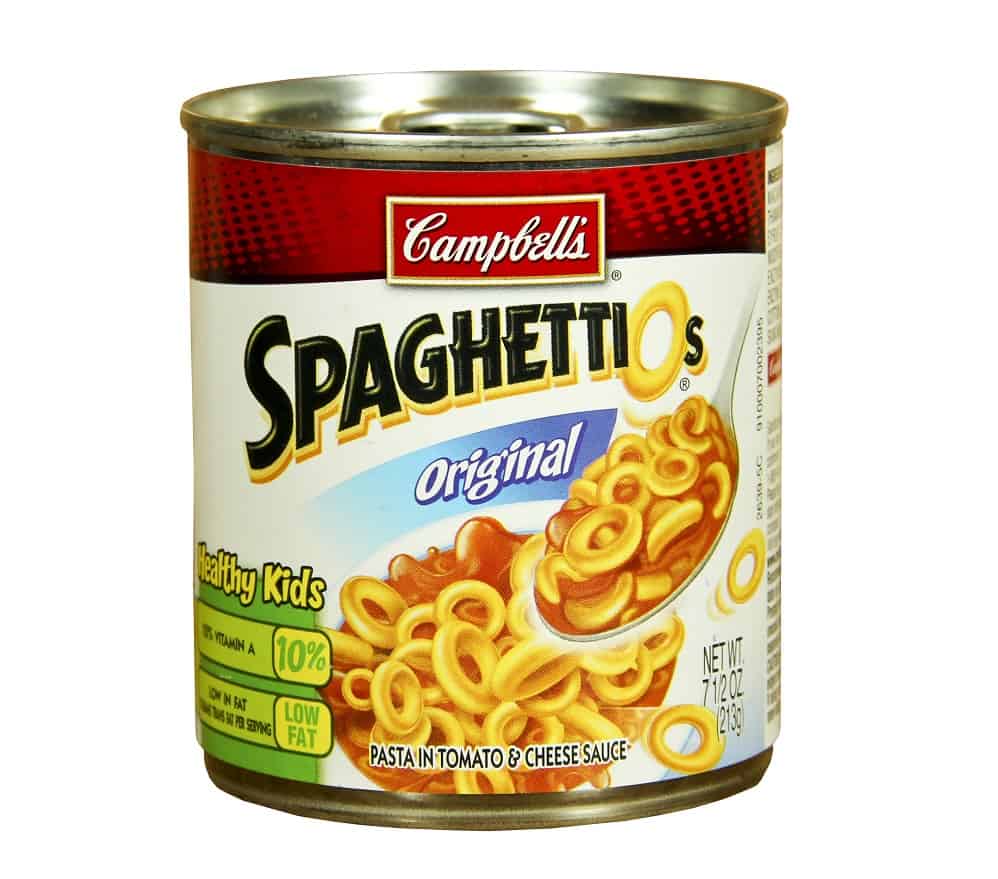SpaghettiOs is a popular brand of pasta with its iconic ring-shaped pasta pieces. Owned by the Campbell Soup Company, the same company that produces a flagship range of canned soup products such as cream of mushroom soup, tomato soup, cream of chicken soup, chicken noodle soup, and many more. SpaghettiOs has proved to be among the best-selling canned food products in the US with the SpaghettiOs with Meatballs selling 43.3 million units sold in 2018 (1).
Unfortunately, the range of SpaghettiOs cannot be considered vegan since all flavors contain various non-vegan ingredients. The Original SpaghettiOs is non-vegan since it contains dairy products, specifically cheddar cheese. All of the other SpaghettiOs flavors on their website contain cheddar cheese as well. Additionally, some flavors would have various types of meat as well. Due to these factors, SpaghettiOs are not appropriate for those with vegan lifestyles.
Table of Contents
Are SpaghettiOs Vegan?
Simply put, SpaghettiOs cannot be considered vegan since the products contain ingredients that are blatantly derived from animals.
For one, the Original SpaghettiOs and all the other flavors are listed to contain cheddar cheese – a type of dairy product. From that alone, they cannot be considered vegan since milk and dairy products are animal products obtained from cows. Many vegans and animal rights activist groups abstain from products coming from the milk industry due to the unethical treatment of cows in the industry.

Aside from cheese, some flavors of SpaghettiOs would also contain ingredients that cannot be considered vegan. One of the first ingredients that vegans have to avoid is meat, and there are a few SpaghettiOs flavors that contain meat such as SpaghettiOs A to Z with Meatballs, SpaghettiOs with Franks, and SpaghettiOs with Meatballs.
While SpaghettiOs Plus Calcium does not contain meat, this specific SpaghettiOs flavor is listed to contain vitamin D as a result of enriched pasta. While vitamins are undoubtedly important for human growth and development, the majority of commercially produced vitamin D cannot be considered vegan. The modern methods of producing vitamin D revolves around the conversion of a cholesterol obtained from sheep’s wool into an active form of vitamin D. Thus, products enriched with commercially produced vitamin D are probably not vegan as well.
SpaghettiOs Ingredients List
The list of ingredients of the Original SpaghettiOs includes (2): water, tomato puree (water, tomato paste), enriched pasta (wheat flour, niacin, ferrous sulfate, thiamine mononitrate, riboflavin, folic acid), high fructose corn syrup. Contains 2% or less of: salt, enzyme modified cheddar cheese (cheddar cheese [cultured milk, salt, enzymes, calcium chloride], water, disodium phosphate, enzymes), vegetable oil (corn, canola, and/or soybean), enzyme modified butter, skim milk, beta carotene for color, citric acid, paprika extract, flavoring. Contains: wheat, milk.
Aside from the Original SpaghettiOs, the official website (3) also includes a variety of different flavors that would have slightly varying ingredients. The different flavors include A to Z SpaghettiOs, SpaghettiOs Plus Calcium, SpaghettiOs A to Z with Meatballs, SpaghettiOs with Franks, SpaghettiOs with Meatballs, SpaghettiOs Organic A to Z, and Organic Original Pasta.
Dairy
Dairy refers to milk and other products that require milk as a precursor ingredient. These include yogurt, cheese, butter, cream, whey, and so on. Milk is a highly versatile ingredient which is why it can be found in many food products and beverages. Although there are vegan varieties of milk such as almond milk and such, the term typically refers to the milk produced by mammals such as cows, goats, and sheep.
Since milk is a product directly derived from an animal source, milk and dairy products cannot be considered vegan.
Milk and dairy products are considered to be highly unethical by many vegans and animal rights groups due to the inhumane treatment of cows in the milk industry (4). Cows are typically impregnated on purpose to induce lactation or milk production in cows. Once the cows give birth, the offspring are also separated from the mothers to maximize the amount of milk that can be collected. It is also not uncommon to find cows in the milk industry kept in pens that have barely enough room for them to stand in.
SpaghettiOs cannot be considered vegan since the pasta brand contains cheddar cheese, a type of dairy product. Cheddar cheese can be found in the Original SpaghettiOs, SpaghettiOs Plus Calcium, SpaghettiOs A to Z with Meatballs, SpaghettiOs with Franks, SpaghettiOs with Meatballs, SpaghettiOs Organic A to Z, and Organic Original Pasta.
Meat
Meat refers to the flesh of animals that are prepared as food for consumption. Humans eat a wide variety of animal meats such as pork, beef, poultry, fish, and many more. Meat is directly obtained from the slaughter of animals which is why meat is strictly avoided by the vegan community.
Many animals are raised and slaughtered for the purpose of meeting the demands of a significantly meat-eating population. Vegans can have different reasons for not eating meat. While some avoid meat for health reasons, there are those that would avoid meat due to the unethical aspect of livestock agriculture or even for the environmental detriments that it brings about.
While the Original SpaghettiOs does not contain any meat, there are some flavors that do. Specifically, the following flavors include some type of meat: SpaghettiOs A to Z with Meatballs, SpaghettiOs with Franks, and SpaghettiOs with Meatballs.
Vitamin D
It takes a long list of substances to maintain, repair, and develop the human body. Some substances such as carbohydrates, proteins, and lipids are considered macronutrients because the body requires them in large quantities for energy and more. However, there are some nutrients that the body requires in very small amounts – these are called micronutrients. This is where vitamins come in.
Vitamins are primarily obtained from the diet. Even though the body requires these substances in trace amounts, deficiencies in these vitamins can cause highly adverse health effects.
Vegans can acquire most of their vitamin requirements from highly accessible vegan food items. However, vegans are typically wary when they see vitamin D added to ingredients lists. Vitamin D is a unique vitamin in the sense that it is one of the few vitamins that the body can actually produce itself. UV radiation from the sun can catalyze the conversion of a cholesterol found in the skin to become an active form of vitamin D. Vitamin D is incredibly important, but when the vitamin is added to food for enrichment, the vitamin D added is probably not vegan.
Vitamin D has a long history of being commercially produced using animal products such as brains, spinal cords, and livers (5). However, those methods are considered outdated by today’s standards and significantly costly. Thus, the modern methods for producing vitamin D use sheep’s wool as a primary substrate.
Although there are advancements in vitamin D production through vegan means such as synthetic production and biotechnological production using lichen, it would be irresponsible to neglect that the majority of the vitamin D commercially produced nowadays is obtained using sheep’s wool. Thus, products that are enriched with vitamin D are probably not vegan anymore.
Vitamin D is a common vitamin added when enriching productions. While the majority of the SpaghettiOs line does not contain this vitamin, vitamin D can be found in SpaghettiOs Plus Calcium.
References




